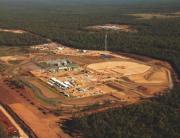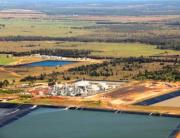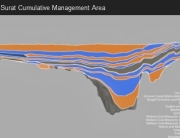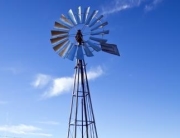CSG more pain than gain?
Queensland’s much anticipated Coal Seam Gas (CSG) royalty “bonanza” could evaporate, if current disastrously low export spot prices persist for CSG exported as liquefied natural gas (LNG). This price collapse could trigger renegotiation clauses in existing contract prices, significantly lowering prices.
Such a price reduction would ensure that Queenslanders will experience generations of environmental pain for little if any economic gain, according to stakeholder group, Basin Sustainability Alliance (BSA).
Drawing on information sourced from a British Gas report and an Oxford University paper entitled “The Future of Australian LNG exports”, BSA has calculated that the royalty payments being made to the Queensland Government from the profits of coal seam gas activities could be a dismal fraction of what was initially predicted by the Government.
BSA Chair Lyn Nicholson said BSA was concerned that landholders and regional communities have had to suffer degradation of their land and water, for a result that may bring little net benefit to Queensland.
“Royalties to be paid to the Queensland Government are calculated at 10% of the Well Head Value (WHV). WHV is the net amount after post well head production costs are deducted from the sale price. Currently the spot price delivered North Asia is approximately US $7.50/Gigajoule.
The BSA calls upon the Qld Government to disclose what royalties are generated at current prices so that Queenslanders can assess if the long term environmental, social and agricultural costs are worth the questionable short term economic benefits of a 25 year CSG industry” Ms Nicholson said.
Ms Nicholson said the Government has expected agricultural businesses to play second fiddle to CSG, promising that the industry will be for the greater good of the State, but this has not become a reality.
“When the promises of jobs and economic windfalls from this industry are not being realised, we can’t help but feel like our rural landscapes, water security and way of life have been destroyed for no good reason” Ms Nicholson said.
Ms Nicholson also stated that as CSG prices and royalties fall, the Government and the proponents have a seriously reduced financial capacity to meet their environmental and rehabilitation responsibilities. Landholders are already seeing this in CSG companies increasing reluctance to guarantee their water resources through “water tight” make good agreements.
The Government and the industry had been touting figures like 18,000 jobs to be created. And yet, in a Social and Economic Project by CSIRO’s GISERA has shown that there had only been a net increase of 1,392 jobs in the Surat Basin between 2006 and 2011 mostly in mining, accommodation and construction services. The project used data from the ABS Census and counted the total number of employed residents (after excluding non-resident workforces) at a time when around 5,000 CSG wells had been drilled in Queensland. Whilst industry and Government have projected that there will be 18,000 jobs created for 40,000 CSG wells, it appears that they have failed to communicate that the majority of those jobs will be temporary fly in, fly out and of no benefit to the Surat Basin region where all of the long term impacts from the wells and associated infrastructure will occur.






